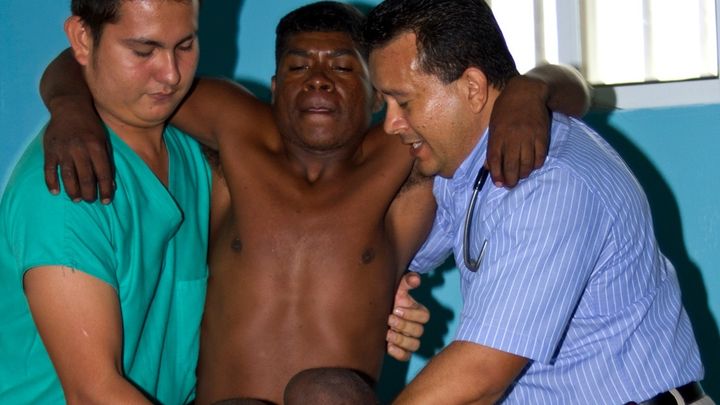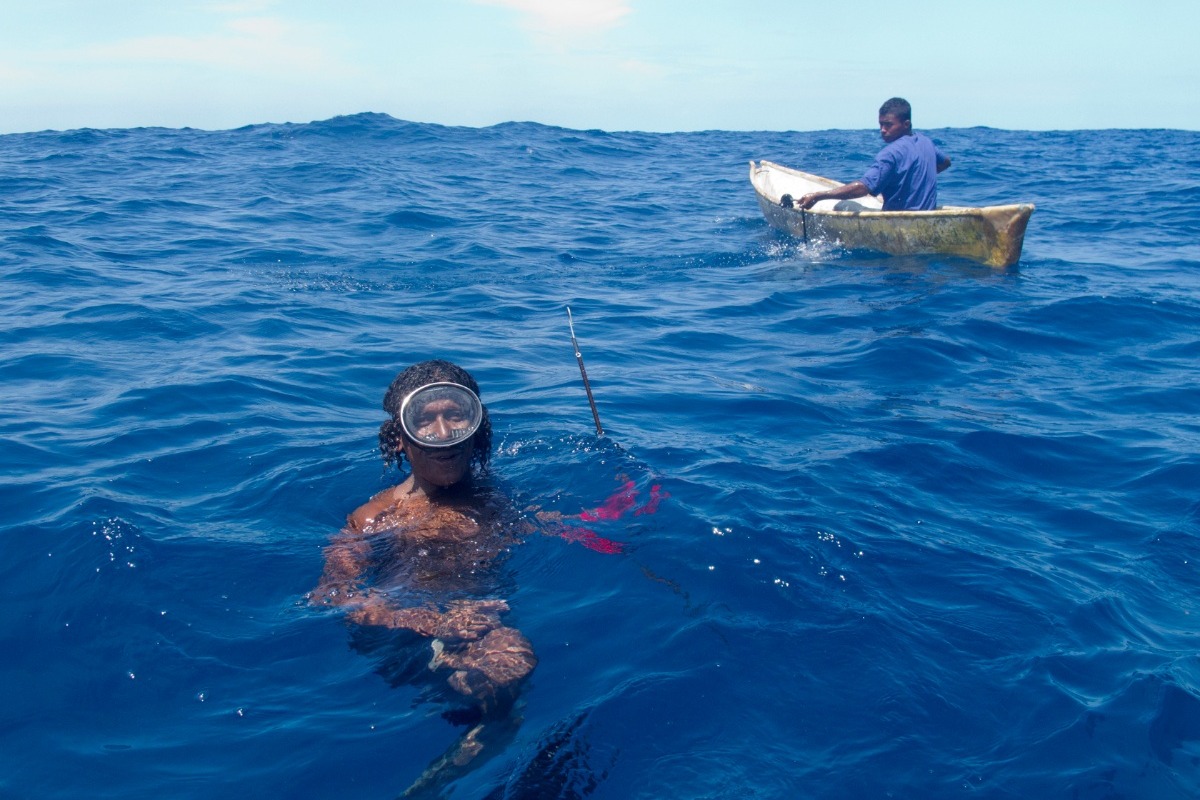
Research program to save lives of divers
Tax deductible

Update: It is with a heavy heart I share with you the sad news that a lobster diving boat in Honduras sank, killing 27 people, including two indigenous Miskito divers who were my patients. When the summer fishing ban ended June 30th, the commercial fishing boats immediately left for the offshore fishing banks. Two overladen boats sank within a 24-hour period. Thankfully, the Honduran navy rescued all aboard the first. Unfortunately, the second boat sank at one o’clock at the morning while most were sleeping and 27 men drowned.
Read a story from the New York Times and a follow up from the Washington Post .

Lack of regulation and coercive practices create reckless conditions for indigenous divers. A boat with a maximum capacity of 49 men (20 divers, 20 cayuqueros --kayak handlers-- and 9 crew members) will routinely carry nearly twice that. Extreme overcrowding reduces the chance of escape when a boat sinks, especially at night when the lack of beds means that hallways are blocked by sleeping bodies. In total, there were 91 people on board when the boat went down.
Living conditions aboard the fishing boats are terrible. They have no toilets, no fresh water and no showers; food preparation is unsanitary, and safety measures for divers are almost non-existent. They repetitively dive to 100 feet of sea water or deeper without depth gauges, watches or air pressure gauges. They return to the boat only to exchange an empty air tank for a full one. When neurological decompression sickness strikes, they are left without medical attention, lying paralyzed on the deck of an overcrowded boat until the 12 days of diving are completed. When the fishing boat returns to harbor, many more days may elapse before they finally reach a chamber for treatment.
My Miskito brothers are truly superhuman. How any survive such extreme dive profiles defies what we know about physiology. However, when they do become paralyzed by decompression illness, many recover partially or completely despite weeks of delay to treatment, defying what we understand medically.
For 25 years, I have been unsuccessful at improving diving safety despite all the workshops, courses, and presentations given to divers, boat owners, and government officials, and despite the recommendations made to the United Nations. We need data to motivate changes.

I have data on more than 400 cases of severe neurological DCS among Miskito fishermen. I am working with the Diving Diseases Research Centre, a UK charity, and the U.S.-based Chronic Disease Registry, a non-profit quality organization, to analyze the data on the late treatment of neurological DCS. The information we gain could help U.S. and U.K. military, scientific, commercial and sport divers. The analysis will identify the risk factors that contribute to these diving injuries, the factors that might contribute to their recovery, and the evidence we need to implement better regulations to protect the divers.
Today there is a lot of media attention on this problem in Honduras, but the attention will disappear quickly and everything will return to the horrible status quo. Help us ensure that these men do not suffer in vain.
Please help fund the Miskito Diver Data project.
Original Post: For more than 20 years, Dr. Elmer Mejia of Honduras risked his life to treat the Moskito Indians who live on the east coast of Honduras and Nicaragua. They suffered injuries using scuba equipment to hunt for lobster – all to feed American and European markets.
Moskito Indians dive to extremes, making a dozen or more dives in a day to depths of 100 feet or more, all chasing spiny lobster across the ocean floor. Often, they end up paralyzed or dying from their injuries right on the boat.
Their dive profiles far exceed safe diving practices. A recreational diver would only be able to make two or three dives over the course or a day and would still be at risk of injury. A military or commercial diver might accept a greater risk to achieve a specific goal but would be supported by a hyperbaric chamber on site that could begin treatment immediately if the diver presented with symptoms following a dive.
Moskito Indians have no such support and their dive sites are two to three days by boat away from a treatment facility that can care for their injuries.
Dr. Mejia often advocated for better working conditions for the divers, putting himself and his family at risk. All the while, he treated more severe cases of decompression illness than any other diving doctor in the world. He literally saw thousands of cases where divers lost the ability to walk or urinate on their own and were near death.
The only definitive treatment for a diving-related injury caused by the buildup of excess nitrogen in the tissues, commonly called “The Bends”, is for the diver to be recompressed in a hyperbaric chamber for a five-hour treatment.
Often, divers require multiple treatments with a protocol developed by the US Navy called a Treatment Table 6. Conventional wisdom has always maintained that treatments delayed by a few days make it impossible for recovery.
Often, Moskito Indian divers were carried into his clinic in Puerto Lempira, Honduras and were able to walk out under their own power several days later. Most had residual symptoms, but were not paralyzed. His success in many of these cases is nothing short of miraculous.
As he worked, Dr. Mejia developed groundbreaking protocols and challenged accepted practices of when you can treat someone injured in a diving accident. He recorded information on those divers and frequently traveled to their home in Gracia a Dios, on the far eastern tip of Honduras, to perform follow up exams on the divers.
Dr. Mejia was granted permanent resident status in the United States as an immigrant with extraordinary ability. His wealth of knowledge and experience has the potential to set diving and hyperbaric medicine on its ear.
This fundraiser will serve multiple purposes. Dr. Mejia is working with two nonprofit organizations to compile his patient records in a way that his work can be analyzed and used for extensive research.
His patient records were written by hand using paper and pencil and have to be entered into a computer for analysis. Dr. Mejia is working with the American 501(c)(3) organization called the Chronic Disease Registry and the Diving Diseases Research Centre (DDRC) in Plymouth, England.
Donations will go to the US Wound Registry and they will distribute funds to the DDRC in England as they prepare the database and analyze the data for future publication. They will also distribute some of the funds to Dr. Mejia to support him while he does the painstaking work of translating and recording the data.
The results of this research will revolutionize the care for all injured divers, and others who need hyperbaric treatment for wound care.
Dr. Mejia also has evidence that diving injuries among the Moskito Indians tend to be seasonal and occur most often in certain dive locations, an area he describes as the Bermuda Triangle for lobster dives. Having his treatment and accident data analyzed by the DDRC will help government and non-governmental organizations work with the lobster divers to improve their diving safety.
Donations to this fundraiser will make the lives of all divers safer while helping to improve the lives of the indigenous Moskito Indians who have long been exploited for their ability to dive and their lack of other choices to support their families.
Additional links:
Links and photos of the issue by author Eric Douglas.
An excerpt from an NBC story (the complete story is no longer online): Lobster Trap from Rock Center with Brian Williams . It won the 2013 RFK Book and Journalism Award for International Television.
Profile of Dr. Elmer Mejia from The New York Times
Read a highlight of this project on the National Geographic website .
Read a longer report on Honduras and Isla Natividad from Alert Diver magazine on AlertDiver.com . There are two articles and a photo essay of 18 images online.
About the DDRC
DDRC Healthcare is a hyperbaric medical organization located adjacent to the University Hospitals Plymouth NHS Trust (UHPNT) in Plymouth, UK. It is a registered charity (no.279652) and was established in 1980 as the Diving Diseases Research Centre with a goal of understanding the effects of diving on human physiology. The charity moved to its current purpose-built site in 1996, flanked by Plymouth Science Park and the regional Specialist Teaching Hospital, and is in the process of developing a Brain Research and Imaging Centre through a collaborative undertaking with Plymouth University and UHPNT. The project includes the installation of a 3T MRI scanner and a motor control laboratory in addition to upgrading the hyperbaric chamber facilities.
DDRC Healthcare has become a world authority on hyperbaric medical treatments with many publications detailing its work. Its charitable aims now encompass research, treatment and education and it strives to promote and provide high quality, cost effective hyperbaric oxygen (HBO) therapy. DDRC Healthcare is one of the founder members of the British Hyperbaric Association (BHA) and maintains an open dialogue with those associated with all aspects of diving and hyperbaric medicine. The DDRC doctors operate the national diving helpline on behalf of the BHA and treat all indications recommended by the UHMS and EUBS committees.
About the Chronic Disease Registry
The Chronic Disease Registry hosts seven medical research registries - all listed with ClinicalTrials.gov including venous leg ulcers, cellular products, negative pressure wound therapy and podiatry. The organization is recognized by the Center for Medicare and Medicaid (CMS) as quality registries for reporting data on behalf of physicians. They have their own Institutional Review Board (IRB) for reviewing research protocols that use the data and analyzes data to develop improved practice guidelines. Their motto is “Harnessing Technology for Healthcare to Find What Works”.
Co-organizers (3)
Eric Douglas
Organizer
Elkview, WV
Chronic Disease Registry Inc
Beneficiary
Caroline Fife
Co-organizer
John Moore
Co-organizer